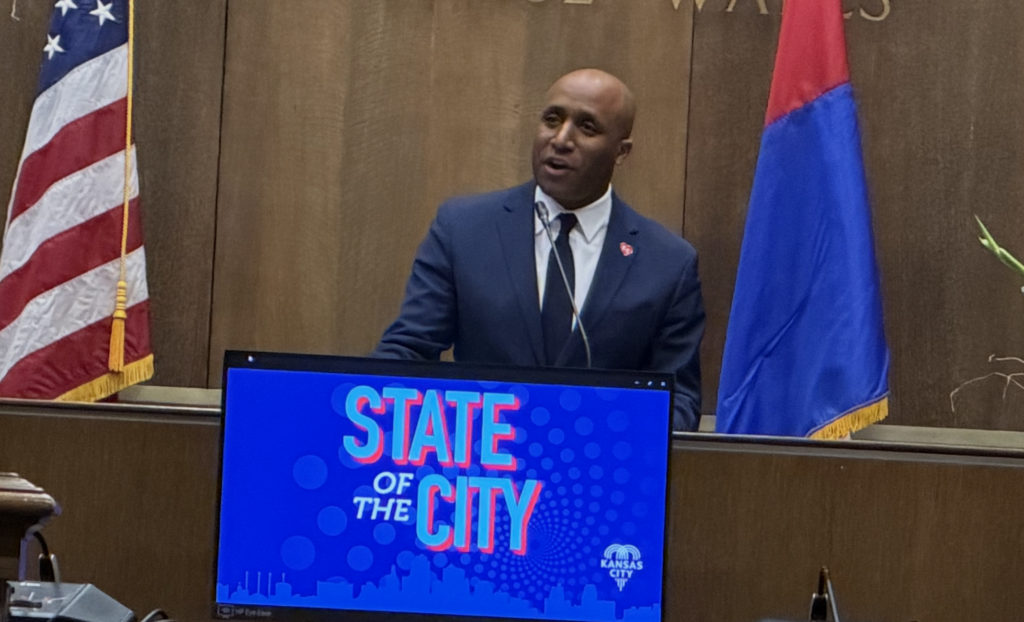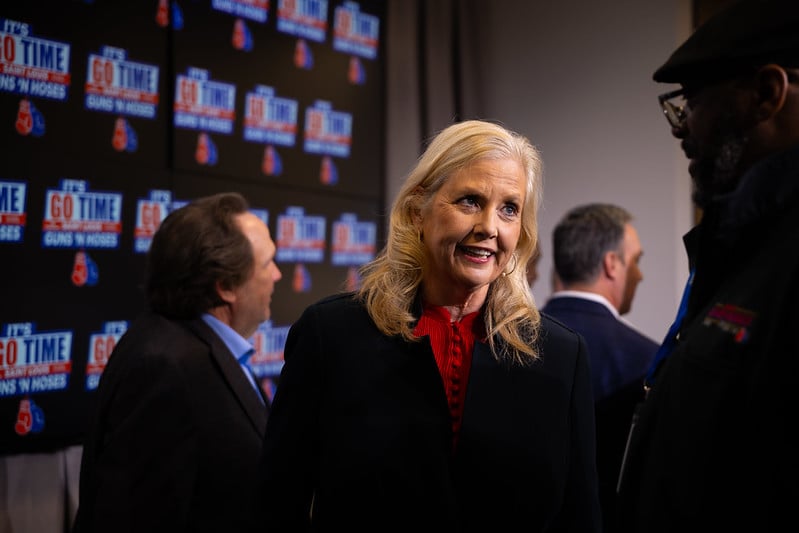Bank Against America: AGs Bailey and Kobach should fight financial discrimination for all–not the few
At the end of March 2024, the Human Rights Campaign (HRC) released its annual LGBTQ+ Financial Wellness Report through its foundation, in recognition of Financial Literacy Month–recognized in April each year. Data collected from 1,899 LGBTQ+ adults from across the United States shows ongoing challenges people in these communities face in being “financially well” and having access to basic financial services. The financial wellness report finds that 48 percent of all LGBTQ+ adults are “financially unwell,” compared to a quarter of the general population.
BIPOC and younger LGBTQ+ adults are even more likely to report that they are financially unwell. Three in ten LGBTQ+ adults, exactly 30.8 percent, have experienced discrimination of some sort in attempting to access basic financial services like a bank account or credit card. The HRC report points out, after adjusting data for age and race, that LGBTQ+ adults who reported some degree of financial discrimination throughout their lifetimes are not doing well financially and, in fact, are doing worse off than the previous year. Of that subset, 62.6 percent of those who have experienced discrimination in trying to access financial services are not doing well financially.
“This report is a snapshot into the financial challenges that many LGBTQ+ people navigate, including poverty and discrimination while accessing financial services,” HRC Foundation Associate Director of Public Education Charleigh Flohr said in a statement. Maruka Rivers, director of economic empowerment, says, “I hope the data are a call to action.”
This call to action Rivers refers to has been echoed time and again by LGBTQ+ rights groups who recognize an ongoing crisis of potential financial discrimination and bias against LGBTQ+ people held by financial institutions, financial technology companies, and others in this space.
Major banks have tried to reform internally by adopting environmental, social, and governance frameworks that highlight the importance of queer and BIPOC visibility and access in the U.S. financial system. The most recent data on unbanked and underbanked individuals in the United States from the Federal Deposit Insurance Corporation (FDIC) indicates that the number of people who are unbanked, or have no access to a bank account or financial services product, is at an all-time low. Federal agencies like the Consumer Financial Protection Bureau have seen success in fighting financial censorship and bias in the credit services space.
What more can be done? For some, the answer is simple: fighting for their financial rights in the courtroom or by relying on a state’s chief consumer protection officer—the attorney general—to go out on a limb and defend the public interest from any malfeasance instigated by the financial institutions.
Shortly after the Human Rights Campaign released its financial report, right-wing news media lit up. A coalition of fifteen of the most conservative, pro-Trump Republican attorneys general from across the country sent a letter to the CEO of Bank of America, Brian Moynihan, demanding the major bank stop discriminating against religious conservative organizations that support former President Donald Trump. Led by the far-right Kansas Attorney General Kris Kobach, the letter accused Moynihan of the act of “de-banking” conservative groups, due to these group’s political positions that supposedly clash with the “progressive” corporate culture of the major bank. Kobach was joined by Missouri Attorney General Andrew Bailey in signing the joint letter.
The joint letter from the attorneys general argues: “Unfortunately, Bank of America appears to be conditioning access to its services on customers having the bank’s preferred religious or political views. Your discriminatory behavior is a serious threat to free speech and religious freedom, is potentially illegal, and is causing political and regulatory backlash. Bank of America is exposing itself to numerous legal risks by engaging in de-banking.”
“De-banking” is the practice of financial institutions closing banking or credit accounts with consumers they deem high-risk. According to an exploratory study of the practice released in 2015, Oxfam and the Global Center on Cooperative Security discuss perceived or assessed risks related to all banking activity for certain people. “Underlying the practice of de-risking is the assumption that the affected customers present a higher risk of using their bank accounts as a medium for raising, moving, and storing funds that are somehow “tainted,” reads the executive summary of the report. These classifications include acts such as money laundering, financing of terrorist activity, circumventing financial sanctions on governments, and/or supporting illicit acts.
Assessments of de-banking or de-risking include financial institutions closing the accounts of consumers they view as potential risks or carrying some sort of political exposure. In the view of the attorneys general, the claims that Bank of America de-banking groups that are somehow or entirely “politically exposed”–like groups that fund anti-LGBTQ+ campaigns–meet this criteria.
They allege that Bank of America has a preferential political ideology and religious viewpoints.
A spokesperson for Bank of America told Banking Dive in April such a claim is nonsensical. In response to Banking Dive reporter Gabrielle Saulsbery, the Bank of America spokesperson said, “It’s absurd to think religious beliefs are a factor in any account closing decision,” and how “Political viewpoints are not a factor in any account closing decision.” While the claims from Bank of America might satiate most stakeholders, including regular run-of-the-mill consumers, Attorneys General Bailey and Kobach, with their colleagues, do bring up a real concern: the inexplicable power of financial institutions. Nevertheless, these attorneys general’s collective intentions of pressing the chief executive officer of the second largest bank in the United States on bias and viewpoint discrimination are simply political and ideologically selfish to anyone else.
Financial discrimination, no matter who is the victim, is never a good thing. Even hate-spewing anti-LGBTQ+ hate groups are entitled to the same First Amendment rights as anyone else. But, it is the position of this journalist that Bailey, Kobach, and their thirteen other colleagues reveal a double standard in the defense of the rights of consumers or “politically exposed” individuals.
Data shows that financial discrimination, bias, and the use of tactics like de-banking are more likely to target far more marginalized groups than conservative Christians—many who are white evangelicals and may sympathize with Christian nationalism. Barring that Bank of America has previously donated thousands of dollars to anti-LGBTQ+ groups, the attorneys general who signed the letter are pretending to not even consider financial discrimination against groups like Muslims, LGBTQ+ individuals, and individuals in legal commercial sex work.
Kobach and Bailey choose not to recognize that financial discrimination and de-banking are a far greater risk for people who are actually likely to be financially discriminated against.
The Pitch sought out experts and activists to speak on the topics of financial discrimination and the political activity of attorneys general from the civil society. Consider what Mark C. Miller told us.
Now retired, Miller remains a preeminent scholar on the role of state attorneys general and the position’s evolution, from a behind-the-scenes law enforcement official to a purely partisan position whose power rivals, and even surpasses, that of a governor. Miller authored a study in 2021 for the peer-reviewed Journal of Legislation—published by the Notre Dame Law School—where he argues that the role of attorney general is now simply a political one. Holders of this office in their respective states are only accountable to their donors, political allies, and their loyal voters.
“States attorneys general can sue on behalf of the ‘public interest,’ and they get to define what that is,” Miller says. “That basically means unlimited lawsuits.”
Miller has characterized members of the legal profession—lawyers—serve as the “high priests” of American politics. He added that lawyers are the only people who can be elected to the office of state attorney general in their specific jurisdictions. “Basically, attorneys general are leading the charge of their national party’s interests for their own political gain,” Miller says. He referred to how attorneys general rarely reach across party lines anymore to coordinate on litigation, due to the differences in ideology and what a Democratic-leaning attorney general may define as the “public interest” versus what a Republican-leaning attorney general defines as representing the “public interest.” For historical context alone, the last time any attorneys general overwhelmingly coordinated and broke party lines was in the 1990s when multiple states brought about the Master Settlement Agreement reached between the attorneys general and tobacco companies.
A split occurred when the attorneys general formed their own partisan funding mechanisms in the form of 527 political advocacy committees: The Democratic Attorneys General Association (DAGA) and The Republican Attorneys General Association (RAGA).
In the context of the letter to Bank of America from the fifteen Republican attorneys general, Miller points out that defining the “public interest” of defending the conservative groups from financial discrimination and not other individuals who may be victimized by such practices should be expected. The “public interest” in this case doesn’t include individuals who are more likely to face some level of discrimination.
Miller says, “I would assume, that if Democratic attorneys general were asked, many of their offices, in some way, are investigating banking issues for marginalized groups. Whereas, there is no political benefit at the moment for conservative Republican attorneys general to do the same thing.” He then concluded his observations, stating that the timing of the Bank of America letter only seems possible because it was motivated by the donors and ideological backers of attorneys general, such as Bailey and Kobach. “A letter is low resources, compared to filing a lawsuit that takes major resources,” Miller says. “They’re doing this as a favor to their donors.”
In many ways, this is the elephant in the room. There is no political gain for Kobach, who won his 2022 campaign for Kansas Attorney General after he lost his bid for governor in 2018, or for Bailey, who is running to win his first full term as Missouri Attorney General after being selected to replace Eric Schmitt when he won his bid for the U.S. Senate. Bailey and Kobach notoriously tow the party line: anti-LGBTQ+ political positions, blind support for indicted former President Donald Trump, and xenophobic calls of action to end illegal immigration through any means.
For example, Attorney General Bailey has made a name for himself for taking very aggressive positions against gender-affirming care and basic rights for transgender Missourians. In 2023, Bailey tried to effectively ban access to gender-affirming care through emergency rulemaking but withdrew the order. He’s also expressed his intent to drawback LGBTQ+ rights in the state.
LGBTQ+ people Bailey and Kobach are supposedly tasked with representing are overlooked.
The Pitch reached out to PROMO Missouri for comment. Shira Berkowitz, PROMO Missouri’s senior director of public policy and advocacy, says they agreed with the assessment of irony in the attorneys general sending a letter to a bank alleging discrimination against conservatives.
“I would agree that this is certainly not what the majority of Missourians expected of how the attorney general should be spending his time,” Berkowitz says. “From our perspective, we would much rather see an attorney general who would be willing to work with our communities to create an equitable and just experience for LGBTQ+ Missourians.”
Berkowitz characterized Andrew Bailey as the “frontrunner” of individuals who are trying to “devalue trans-Missourians and erase us from existence.” “Our agenda is very clear,” they said. “We want LGBTQ+ Missourians to have the same protection and opportunities that others have to make a living, and not fear discrimination and retaliation. Instead, we are represented by a leader who is working with other state leaders who wish to do the most harm.”
“Marginalization and discrimination are most often experienced by people in communities of color and marginalized labor forces,” Woodhull Freedom Foundation President and CEO Ricci Levy says. The Pitch reached out to Woodhull because the group is a staunch supporter of sex workers’ rights, and sex workers are commonly discriminated against in several forms—especially financial discrimination and de-banking. “A large portion of the sex worker population is also in the LGBTQ+ population,” Levy says, alluding to data collected by the Free Speech Coalition and Sex Work CEO. The Free Speech Coalition is a national trade group representing adult entertainment industry stakeholders, such as performers and adult creators.
In May 2023, the coalition and Sex Work CEO reported that 63 percent of respondents to a national survey—all adult industry professionals—lost access to a bank account or financial tool (e.g., PayPal). Nearly two in three respondents who identified themselves as adult content creators report they are members of the LGBTQ+ community. Within this group, respondents are more likely to be people of color and/or gender nonconforming. Considering this data, Levy explains that while, in general, not all LGBTQ+ people are sex workers or adult content creators, most identify as LGBTQ+. Sex workers’ rights groups have reported, in some form or another, financial discrimination in attempts to restrict First Amendment-protected sexual expression.
Credit card companies Visa and Mastercard have turned the screws on adult platforms and content creators, too. This prompted the American Civil Liberties Union to file a consumer complaint on behalf of a New York-based trans adult content creator and other sex worker’s rights groups against Mastercard at the Federal Trade Commission, alleging discriminatory business practices that violate federal law.
“Addressing financial discrimination against LGBTQ+ individuals, including sex workers, necessitates a concerted effort to uphold their human rights,” Levy says. “For this to become a reality, we need to implement robust legal protections, enacting policy reforms that safeguard LGBTQ+ individuals from discrimination in all spheres of life, regardless of their choice of labor, and fostering social awareness and acceptance.” Utilizing human rights rhetoric, Levy’s words offer a segue to one other group of observers and activists, who are discriminated against by the financial system far more than conservative Christian organizations: Muslims.
Think about this briefly. According to the Institute for Social Policy and Understanding, Muslims are more likely to face financial discrimination than individuals in most religious groups.
Erum Ikramullah—the senior research project manager for the institute—told The Pitch that 27 percent of Muslims in the U.S. have experienced challenges with financial institutions, “compared with 12 percent of the general public and 8-14 percent of other religious groups.”
“The most common reasons given were: restrictions on international transactions, sending or receiving funds from unfamiliar people, a keyword in the transaction was flagged, credit issues, and problems with other accounts,” Ikramullah says, explaining the results of the institute’s 2022 American Muslim Poll. Erum Ikramullah adds, “For context, we know that half of American Muslims are immigrants, so making international financial transactions is not surprising. ISPU’s data point to discriminatory practices that warrant further investigation.”
While a different group of individuals, the collective evidence shows a clear lack of inclusion by the attorneys general in their letter to Bank of America leadership. Regardless of who or what they believe, it should be incumbent upon elected officials to, not only enforce the law equitably, but also defend those under the law equitably.





